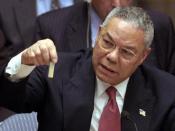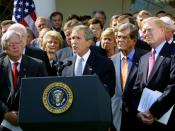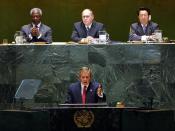War and the media: propaganda and persuasion in the Gulf WarPhilip M. TaylorManchester2nd edition, 1998The United Nations and the Iraq-Kuwait Conflict 1990-1996Boutros Boutros-GhaliNew YorkPublished by United Nations1996Ethics of the Gulf War: Religion, Rhetoric, and RighteousnessKenneth L. VauxSan Francisco,Westview press incOn August 2, 1990, Iraqi troops crossed over the border of their southeastern neighbor (Bratman, 5). Saddam had sent his troops into its fellow Arab country and into what was to become the Persian Gulf War. When the UN ÃÂcondemned the invasionÃÂ, Iraq refused to ÃÂunconditionally withdraw all its forcesÃÂ (Boutros, 15 and Vaux, 9). In response, the United States sent troops to drive Iraq from Kuwait. The United States were not justified in their attack despite United Nations approval. Guidelines of a just war were not followed by the United States. Also, the United States embellished the extent of the Iraqi invasion to get the United Nations to support them in their take over.
In addition, the Iraqi reasons were equally deficient as the United States, so the US could not justify their actions by saying their reasons for invading were superior to their oppositions because in fact, the United States were motivated by economic opportunities and not Kuwaiti suffering as they claimed.
Firstly, when asking the question of whether or not the Persian Gulf War was justified, one must first ask the question of what is a just war. The Augustinian tradition of war suggests that in a just war, ÃÂthere is a greater merit in preventing war by peaceful negotiation and conciliation than in vindicating rights by bloodshedÃÂ (Vaux, 1). Using this theory, it is fair to say that the only thing that the US did to prevent war by ÃÂpeaceful negotiationÃÂ was to bring the issue before the Security Council. The Security Council, not the US...


